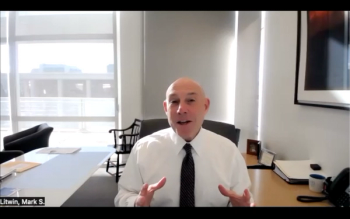
Sperm harvest request raises ethical, legal questions
“After more than 10 years in urology (including 5 in residency), I thought I was reaching the point where I have at least heard of all things urologic… Once again, life proved me wrong,” writes Henry Rosevear, MD.
Dr. Rosevear is a urologist in community practice in Colorado Springs, CO. Urology Times blogs present opinions, advice, and news from urologists and other urology professionals. Opinions expressed by bloggers are their own, and do not necessarily reflect the views of Urology Times or its parent company, UBM Medica.
After more than 10 years in urology (including 5 in residency), I thought I was reaching the point where I have at least heard of all things urologic. Of course, I cannot say I have done everything-I have never attempted nor will I ever attempt removing a caval thrombus during a nephrectomy.
Once again, life proved me wrong.
It was late Friday and I was on call when I received an ICU consult asking me to harvest sperm from a dead man. My heart stopped for a moment, as I had never even considered this problem and didn’t even know where to start.
Related -
I thought it would be useful to walk through some of the medical, ethical, legal, and logistical issues associated with this problem for no other reason than if you find yourself in a similar situation, you can simply consult this article and not to have reinvent the wheel.
On the assumption that I am never the smartest man in the room, I asked Urology Times’ resident infertility specialist,
Are there any guidelines on this topic?
Yes. The American Society for Reproductive Medicine has recently written
Where do you start?
With the patient. Talk to the family. Ask about the means of death as certain high-velocity or explosive causes of death may have led to previously unrecognized damage to the scrotum. However, sperm are incredibly hardy and it is very very unlikely that the sperm would be damaged from anything other than some sort of injury that caused the scrotum to be iatrogenically removed along with the testicles.
Do an exam and look for evidence of scrotal injury. Ask about prior conceptions, as the patient may not have viable sperm to be harvested. Further, a history asking the spouse/partner/family about prior paternity, testosterone or anabolic steroid use or other procedures on the testicles is critical.
Is there time pressure?
Viable sperm may be retrieved for up to 24 to 48 hours after cardiovascular death. If, however, the patient is on life support awaiting organ harvest, there is no time limit as long as the testes remain perfused.
Are there institutional concerns?
Yes. Contacting the hospital ethics committee is vital, as certain religiously affiliated hospitals may have policies preventing harvesting of sperm. If you encounter this situation, asking the hospital to transfer the patient to another facility where the sperm harvest is allowed is ethically and legally appropriate and the facility that is denying the harvest has an obligation to facilitate the transfer. Programs are not ethically obligated to participate in posthumous assisted reproduction but should develop written policies describing when they will and won’t participate.
There are also a number of medicolegal implications for IVF clinics that will store and, potentially, create embryos from this sperm so it is critical to fully understand your institution’s ethical and institutional policies. Also, as this is a procedure not covered by insurance, it is helpful to have transparent pricing and a clear policy in place.
Next:
Sperm harvested in this manner can only be used with certain artificial reproductive technology. Counseling the family on the limitations with the sperm is vital. Specifically, sperm can only be used for IVF/ICSI.
What legal issues should be considered?
There are no federal legal statutes governing this situation, but state laws exist and vary. Clinics providing this service should be aware of all applicable state laws and provide counseling regarding patients’ legal rights and those of their offspring.
As a urologist, are you required to do this procedure?
No. If you do not want to participate in this consult, however, you should make every effort to find a urologist who is willing to do it.
Who gives consent?
When there is no documentation signed by the decedent, the partner or spouse may give consent. Some institutions require another affidavit by someone else such as a licensed mental health professional or another physician documenting that the couple was either planning to or currently trying to conceive.
How do you do it?
Any sperm retrieval technique will work and we usually try to use the least invasive. If you are working in coordination with an organ donation team, consider allowing the organ harvest to happen first before proceeding with orchiectomy as sperm are viable for 24 to 48 hours after cardiovascular death.
At our institution, we typically perform a needle aspiration for cadaveric organ donors, but for patients who are already deceased and at the morgue, we perform a simple open biopsy through a midline incision. It is critial to have an andrology lab to help support these efforts and freeze the sperm.
Newsletter
Stay current with the latest urology news and practice-changing insights — sign up now for the essential updates every urologist needs.






